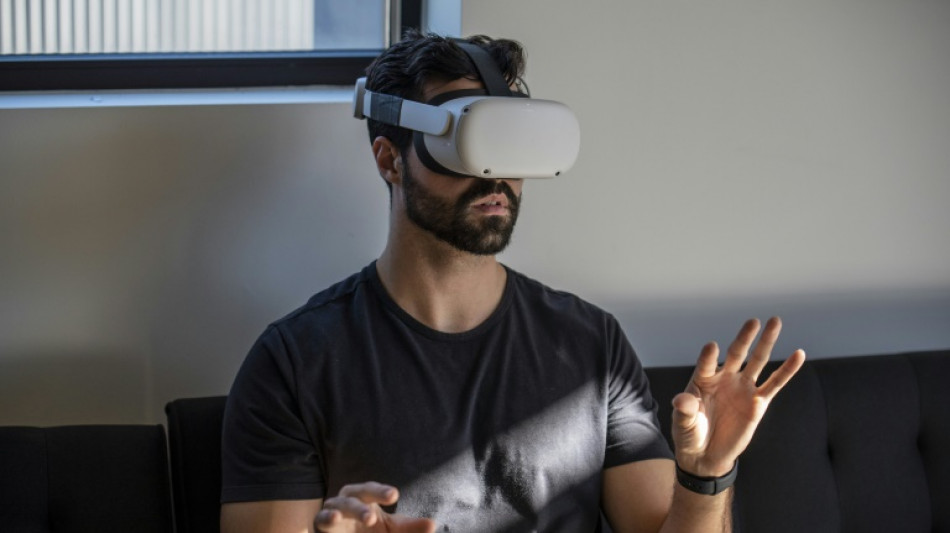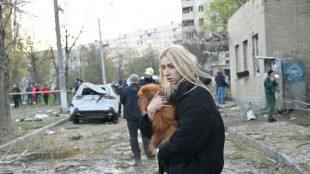
-
 SFWJ / Medcana Announces Strategic Expansion Into Australia With Acquisition of Cannabis Import and Distribution Licenses
SFWJ / Medcana Announces Strategic Expansion Into Australia With Acquisition of Cannabis Import and Distribution Licenses
-
Maresca confident he will survive Chelsea slump

-
 Mob beats to death man from persecuted Pakistan minority
Mob beats to death man from persecuted Pakistan minority
-
Lebanon says one killed in Israeli strike near Sidon

-
 Arsenal's Havertz could return for Champions League final
Arsenal's Havertz could return for Champions League final
-
US officials split on Ukraine truce prospects

-
 Client brain-dead after Paris cryotherapy session goes wrong
Client brain-dead after Paris cryotherapy session goes wrong
-
Flick demands answers from La Liga for 'joke' schedule

-
 'Maddest game' sums up Man Utd career for Maguire
'Maddest game' sums up Man Utd career for Maguire
-
Trial opens for students, journalists over Istanbul protests

-
 Gaza rescuers say Israeli strikes kill 24 after Hamas rejects truce proposal
Gaza rescuers say Israeli strikes kill 24 after Hamas rejects truce proposal
-
'Really stuck': Ukraine's EU accession drive stumbles

-
 'Not the time to discuss future', says Alonso amid Real Madrid links
'Not the time to discuss future', says Alonso amid Real Madrid links
-
74 killed in deadliest US attack on Yemen, Huthis say

-
 Southgate's ex-assistant Holland fired by Japan's Yokohama
Southgate's ex-assistant Holland fired by Japan's Yokohama
-
Vance meets Meloni in Rome before Easter at the Vatican

-
 Ryan Gosling to star in new 'Star Wars' film
Ryan Gosling to star in new 'Star Wars' film
-
Hamas calls for pressure to end Israel's aid block on Gaza

-
 Russia says Ukraine energy truce over, US mulls peace talks exit
Russia says Ukraine energy truce over, US mulls peace talks exit
-
58 killed in deadliest US strike on Yemen, Huthis say

-
 Museums rethink how the Holocaust should be shown
Museums rethink how the Holocaust should be shown
-
Three dead after deadly spring storm wreaks havoc in the Alps

-
 No need for big changes at Liverpool, says Slot
No need for big changes at Liverpool, says Slot
-
Bloody Philippine passion play sees final performance of veteran 'Jesus'

-
 New US envoy prays, delivers Trump 'peace' message at Western Wall
New US envoy prays, delivers Trump 'peace' message at Western Wall
-
Postecoglou sticking around 'a little longer' as Spurs show fight in Frankfurt

-
 US threatens to withdraw from Ukraine talks if no progress
US threatens to withdraw from Ukraine talks if no progress
-
Tears and defiance in Sumy as Russia batters Ukraine border city

-
 Russia rains missiles on Ukraine as US mulls ending truce efforts
Russia rains missiles on Ukraine as US mulls ending truce efforts
-
Tokyo leads gains in most Asian markets on trade deal hopes

-
 Two missing after deadly spring snowstorm wreaks havoc in the Alps
Two missing after deadly spring snowstorm wreaks havoc in the Alps
-
'War has taken everything': AFP reporter returns home to Khartoum

-
 US strikes on Yemen fuel port kill 38, Huthis say
US strikes on Yemen fuel port kill 38, Huthis say
-
Slegers targets Lyon scalp in pursuit of Arsenal European glory

-
 'Defend ourselves': Refugee girls in Kenya find strength in taekwondo
'Defend ourselves': Refugee girls in Kenya find strength in taekwondo
-
China's manufacturing backbone feels Trump trade war pinch

-
 Sri Lankans throng to Kandy for rare display of Buddhist relic
Sri Lankans throng to Kandy for rare display of Buddhist relic
-
Chinese vent anger at Trump's trade war with memes, mockery

-
 Heartbroken Brits abandon pets as living costs bite
Heartbroken Brits abandon pets as living costs bite
-
Mongolian LGBTQ youth fight for recognition through music, comedy

-
 Cash crunch leaves Syrians queueing for hours to collect salaries
Cash crunch leaves Syrians queueing for hours to collect salaries
-
Lyon left to regroup for Champions League bid after painful European exit

-
 Unravelling Real Madrid face Athletic Bilbao Liga test
Unravelling Real Madrid face Athletic Bilbao Liga test
-
Napoli disturbing buoyant Inter's peace in Serie A Easter bonanza

-
 Disappointed Dortmund chase consistency with Europe at stake
Disappointed Dortmund chase consistency with Europe at stake
-
Asian markets mixed as traders track tariff talks

-
 Yan and Buhai share lead at LA Championship
Yan and Buhai share lead at LA Championship
-
Under fire at debate, Canada PM Carney tries to focus on Trump

-
 Liverpool poised for Premier League coronation, Leicester, Ipswich for relegation
Liverpool poised for Premier League coronation, Leicester, Ipswich for relegation
-
India's elephant warning system tackles deadly conflict


Telework in metaverse precursors already a reality
Depending on his mood, Jeff Weiser settles down to work in a Parisian cafe, a mysterious cave or high above the Earth, thanks to the budding metaverse.
Weiser lives in the midwestern US state of Ohio but his workplace is in a faux realm accessed using virtual reality head gear.
While still the stuff of science fiction for most people, forerunners of the metaverse vision for the internet's future are already de rigueur for handfuls of people beyond the gamer and techno-hipster crowds.
Weiser, founder of a translation start-up, spends 25 to 35 hours each week working with Oculus VR gear on his head in his home in the city of Cincinnati.
A VR application called "Immersed" lets him synch screens such as his computer and smartphone to his virtual world, shutting out distractions around him at home.
Along with "increased focus," the ergonomics are "perfect," Weiser said. Display screens hover where they are easily seen and can be changed to any size.
Weiser taps on his keyboard without seeing it, and appears from the outside to be speaking to himself.
But in his virtual world, he interacts with avatars of colleagues as far away as Argentina and Ireland.
The pandemic boosted use of telework technologies that make it possible for colleagues to collaborate as teams despite being in different locations.
The Holy Grail is to replicate the kind of personal contact possible in offices.
- Persistence -
Florent Crivello co-founded Teamflow, a startup that tailors software for workers to collaborate virtually from their computers.
"We are building the metaverse for work," Crivello said, who added VR headsets aren't quite ready for "prime time".
"All of our collaboration tools are still on desktop; we want to meet people where they are."
Teamflow virtual offices look like on-screen game boards with meeting rooms, sofas and more.
Workers are represented by round icons that feature their picture, or live video of their face, and can initiate chats with colleagues by moving their "pawn" close to that of a co-worker.
If the person virtually approached has a microphone hooked up, they can automatically hear each other like they would be able to in real life.
Key to the experience is "persistence," the fact that the virtual environment exists whether a particular worker is in it or not, said Crivello.
"That's a defining characteristic," he noted.
For example, Teamflow users who "write" on a virtual white board in a faux meeting room will find it there when they return the next day.
About 1,000 people use the Teamflow app every workday.
VR app "Immersed", for its part, said it has won tens of thousands of users after a difficult period at the end of 2019, when the company almost disappeared.
"The adoption curve was in the disillusioned phase, it was the bottom of the valley and we ran out of money," said Immersed co-founder Renji Bijoy.
"When I told my team that they could go look for jobs, all seven of them said unanimously, 'We're not going anywhere.'"
- Too unreal? -
The pandemic fueled a trend to remote work, reviving investor interest in startups innovating in the sector.
At the same time, VR itself gained momentum, thanks to investments by Facebook-parent Meta in its Oculus unit and the metaverse overall.
"We are trying to build a world where anyone could live anywhere and put on a pair of glasses and feel like they're actually teleporting to their virtual office," Bijoy said.
Missing links, for Bijoy, include lifelike avatars instead of cartoonish animated characters, and body tracking that lets movements or gestures be replicated in virtual worlds.
"It's not that far away," Bijoy said of such technology, expecting to see it "much sooner than five years".
Some users fear that working in VR will be misinterpreted or misunderstood and would rather stay anonymous, like one graphic designer from New York, who used to spend six hours a day working from immersed during the pandemic.
He customized his Oculus headset for comfort, and built his own room in "Immersed", a virtual reproduction of his favorite library complete with rustling pages and soft footsteps.
The New York resident told of his productivity soaring but his health suffering.
He forgot to take breaks, losing track of place and time.
"I would take the headset off and it was kind of jarring, it was just a bit of like a slap in the face, being back in reality," this man said.
A blood test showed he was low on Vitamin D, and he suspected part of the cause was spending so much time out of the sun and in virtual reality.
"I just stopped using it," the designer said. "I don't think that it's healthy to replace reality with virtual reality."
P.Costa--AMWN